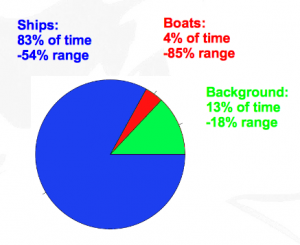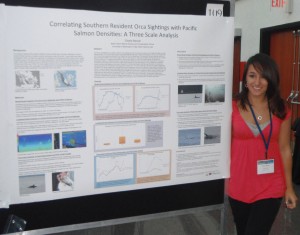Killer whale sessions at the Salish Sea Ecosystem Conference
The whole Beam Reach crew was represented today in two killer whale sessions at the Salish Sea Ecosystem Conference. The sessions were convened by Scott and involved a great line-up of experts(see list of presenters below) talking about recent results from from non/invasive studies of southern resident killer whales (SRKWs).
Val gave a talk on underwater noise in the SRKW critical habitat and estimated that ships dominate the noise budget 83% of time (see plot at right). This works out to a long-term average of nearly a ship per hour!
Jason gave a talk on compensation in ship noise. Andrea Buckman — one of our visiting experts this fall and last spring — spoke about the variable condition of chinook salmon. Robin, Laura, Sharon, Charla, and Hayley attended the sessions, and then continued to share and display their posters — now available on-line as PDFs — listed below.
Student posters:
108 – Sharon Bannick – Movement and Surface Active Behavior of SRKWs in Response to Current Velocity and Salinity
109 – Charla Basran: Correlating SRKW Sightings with Pacific Salmon Densities
110 – Hayley Dorrance: Can clicks tell us anything about the foraging behavior of SRKWs?
112 – Laura Moe: Variations in S6, S10, and S19 calls in SRKWs
Session descriptions and speaker lists:
The killer whales of the Salish Sea are listed as threatened or endangered in both the U.S. and Canada. As the scientific and stewardship communities continue to weigh the costs and benefits of invasive methods like satellite tagging, there is a pressing need to exchange all available information from non-invasive research techniques. There are also renewed efforts on both sides of the border to integrate the management of killer whales and the listed species, like Chinook salmon, upon which they prey. 2011 has also brought Federal regulation of orca-boat interactions in the U.S. This session will survey recent scientific results, with an emphasis on less-invasive techniques and new implications for transboundary killer whale management.
4B: Science and management of killer whales I
John Ford
Pacific Biological Station, Fisheries and Oceans Canada
Contrasting long-term trends in occurrence and abundance of killer whale ecotypes in the Salish Sea
John Ford, Graeme M. Ellis, John W. Durban, Kenneth C. BalcombAmalis Riera
University of Victoria
Acoustic monitoring to delineate killer whale critical habitats off southwestern Vancouver Island
Amalis Riera, John K. Ford, John A. Hildebrand, Sean M. Wiggins, N. Ross ChapmanSamuel Wasser
Center for Conservation Biology
Non-invasive physiological monitoring of Southern Resident Killer Whales
Samuel Wasser, Katherine Ayres, Jessica LundinPeter Ross
Fisheries and Oceans Canada
Ranking contaminant threats to the killer whales of the Salish Sea
Peter Ross, John K.B. Ford, Andrea Buckman, Marie Noel, Frank A.P.C. Gobas, Steve JeffriesTeresa Mongillo
Herrera Environmental Consultants, Inc.
Health implications of exposure to a mixture of pollutants in Southern Resident Killer Whales
Teresa Mongillo, Gina M. Ylitalo, Sandra M. O’Neill, Linda D. Rhodes, Dawn P. Noren, M. Bradley HansonVal Veirs
Beam Reach Marine Science and Sustainability School
Underwater noise in the critical habitat of the endangered Southern Resident Killer Whales
Val Veirs, Scott Veirs, Jason Wood
5B: Science and management of killer whales II
Rob Williams
Oceans Initiative
Inextricably linked: boats, noise, Chinook salmon and killer whale recovery in the northeast Pacific
Rob Williams, Erin Ashe, Christopher W. Clark, Philip S. Hammond, David LusseauJason Wood
SMRU Ltd.
Shipping noise and vocal compensation by Southern Resident Killer Whales: Do some ships have a larger impact?
Jason Wood, Peggy Foreman, Val Veirs, Scott VeirsJeffrey Dismukes
Sysstat, Inc.
Quantification of average summer season marine vessel traffic in the San Juan Islands June 12 – September 7, 2010
Jeffrey Dismukes, Jonathan Riley, Greg CrenshawD.A. Giles
University of California, Davis. Dept. of Wildlife, Fisheries, Conservation Biology
Using non-invasive remote sensing equipment and GIS to assess potential effects of vessels on Southern Resident Killer Whales in the Salish Sea
D.A. Giles, Kari Koski, Rose Cendak, Nicholas RosebergAndrea Buckman
Department of Fisheries and Oceans
Variability in Chinook salmon condition and implications for resident killer whales
Andrea H. Buckman, Nik Veldhoen, Caren C. Helbing, Kristi Miller, John K.B. Ford, Peter S. RossLance Barrett-Lennard
Vancouver Aquarium Marine Science Centre
Saving salmon for endangered killer whales: A new paradigm in wildlife management?Larry Rutter
NOAA Fisheries, National Marine Fisheries ServiceA scientific workshop process to evaluate the effects of salmon fisheries on killer whales
Associated posters:
Associated posters:
107 – Characterizing boater interactions with SRKWs in their critical habitat
111 – Soundwatch recommendations for special management areas for KWs
113 – Responding to the threat of oils spills to SRKWs
Thanks to the PRR Facilitator, Kirsten Hauge, for her help facilitating the sessions by keeping time for the speakers. And thanks to Larry Rutter of NOAA/NMFS for calmly reading his talk from his hard-copy notes because Scott had misplaced his presentation!
Stand by for notes from other sessions, recordings, more blog posts, etc. from the conference…





 Twitter
Twitter LinkedIn
LinkedIn Facebook
Facebook